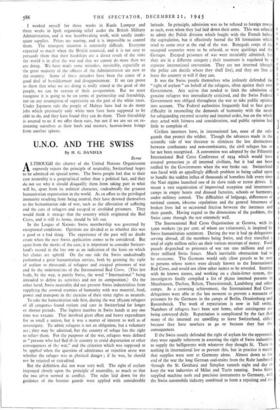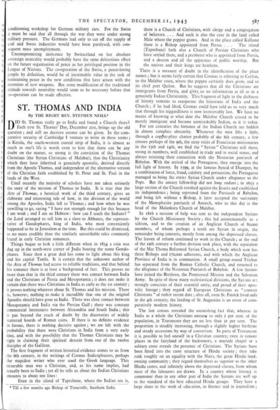U.N.O. AND THE SWISS
By H. G. DANIELS
Berne
ALTHOUGH the charter of the United Nations Organisation expressly rejects the principle of neutrality, Switzerland hopes to be admitted on special terms. The Swiss people feel that in their case neutrality is a geographical rather than a political fact, and they do not see why it should disqualify them from taking part in what will be, apart from its political character, undoubtedly the greatest humanitarian organisation in the world. As an offset to the privileged immunity resulting from being neutral, they have devoted themselves to the humanitarian side of war, such as the alleviation of suffering and the care of refugees and escaped or invalided prisoners. They would think it strange that the country which originated the Red Cross, and is still its home, should be left out.
In the League of Nations Swiss membership was governed by exceptional conditions. Opinions are divided as to whether this was a good or a bad thing. The experience of the past will no doubt count when the new Swiss application comes to be considered. But apart from the merits of the case, it is important to consider Switzer- land's record in the late war as an indication of the basis on which her claims are upheld On the one side the Swiss undoubtedly performed a great humanitarian service, both by granting the right of asylum to thousands of refugees and escaped prisoners of war and by the ministrations of the International Red Cross. (This last body, by the way, is purely Swiss, the word " International " being intended to define its activities and not its composition.) Oa the other hand, Swiss neutrality did not prevent Swiss industrialists from supplying the avowed enemies of humanity with war material, food, power and transport in the exercise of their strict rights as neutrals.
To take the humanitarian side first, during the war 283,000 refugees of all categories found asylum and care in Switzerland for longer or shorter periods. The highest number in Swiss hands at any one time was rto,000. That involved great effort and heavy expenditure for so small a nation, but it was a matter of interest as well as of sovereignty. To admit refugees is not an obligation, but a voluntary act ; they may be admitted, but the country of refuge has the right to refuse them. For the purposes of the war, refugees were defined as " persons who had fled their country to avoid deportation or other consequences of the war," and the criterion which was supposed to be applied when the question of admittance or rejection arose was whether the refugee was in physical danger ; if he was, he should not be rejected or extradited.
But the definition did not wear very well. The right of asylum impinged closely upon the principle of neutrality, so much so that the two often seemed in conflict. The rules laid down for the guidance of the frontier guards were applied with considerable latitude. In principle, admission was to be refused to foreign troops as such, even when -they had laid down their arms. This was relaxed to admit the Polish division which fought with the French before the capitulation, but it effectively barred the SS formations which tried to come over at the end of the war. Renegade corps of the occupied countries were to be refused, as were quislings and the Gestapo. Escaped prisoners of war were invariably admitted, but they are in a different category ; their treatment is regulated by a separate international convention. They are not interned (though the police can decide where they shall live), and they are free to leave the country at will if they can.
It was the Swiss people themselves who jealously defended the " right of asylum " on behalf of the refugees, often against their own Government. Any action that tended to limit the admission of genuine refugees was immediately criticised, and the Swiss Federal Government was obliged throughout the war to take public opinion into account. The Federal authorities frequently had to face great difficulty in reconciling the demands of humanity with the needs for safeguarding external security and internal order, but on the whole they acted with fairness and consideration, and public opinion had little to complain of.
Civilian internees have, in international law, none of the safe- guards that protect the soldier. Though the advances made in the scientific side of war threaten- to eliminate the last distinctions between combatants and non-combatants, the civil refugee has so far not been recognised. A convention was adopted by the Fifteenth International Red Cross Conference of 1934 which would have assured protection ,zo all interned civilians, but it had not been ratified by the Governments when the war broke out. Switzerland was faced with an appallingly difficult problem in being called upon to handle the sudden influx of thousands, of homeless folk every time the Nazi regime launched one of its slave raids or terror drives. It meant a vast organisation of improvised reception and internment camps in empty hotels and disused factories, schools or hutments, under military control. The difficulties of language, differences of national custom, irksome regulations and the general bitterness of broken lives led to occasional friction between the internees and their guards. Having regard to the dimensions of the problem, the Swiss came through the test extremely well.
The International Red Cross Organisation at Geneva, with its 3,000 workers (50 per cent. of whom are volunteers), is inspired by Swiss humanitarian sentiment. During the war it had 59 delegations serving abroad, all the members being Swiss, and they travelled a total of eight million miles on their various missions of mercy. Food parcels dispatched to prisoners of war ran into millions and cost three milliard Swiss francs. Much inevitable obstruction had to be overcome. The Germans would only allow parcels to be sent to persons whose names were already known to the International Red Cross, and would not allow other names to be revealed. Starting with 6o known names, and working on a chain-letter system, the investigators finally compiled a list of 56,000 interned persons in Mauthausen, Dachau, Belsen, Theresienstadt, Landsberg and other camps. As a crowning achievement, the International Red Cross delegations were able at the last moment to prevent a massacre of prisoners by the Germans in the camps of Berlin, Oranienburg and Ravensbriick. The work of repatriation is now in full swing. Numbers of refugees have been sent home, other contingents are being convoyed daily. Repatriation is complicated by the fact that many of the interned are unwilling to leave Switzerland, either because they have nowhere to go or because they fear the consequences.
If the Swiss stoutly defended the right of asylum for the oppressed, they were equally vehement in asserting the right of Swiss industries to supply the belligerents with whatever they thought fit. There is nothing in international law to prevent this, but in practice it meant that supplies were sent to Germany alone. Almost down to the end of the war the long German coal-trains from the Ruhr lumbered through the St. Gotthard and Simplon tunnels night and day to keep the war industries of Milan and Turin running. Swiss firms supplied machine tools and precision instruments to Germany, and the Swiss automobile industry combined to form a repairing and re- Nr1 conditioning workshop for German military cars. For the Swiss re it must be said that all through the war they were under strong military pressure. The Germans had only to cut off the supply of re coal and Swiss industries would have been paralysed, with con- sequent mass unemployment.
Uncompromising insistence by Switzerland on her absolute a sovereign neutrality would probably have the same deleterious effect h on the future organisation of peace as her privileged position in the 0 League of Nations. The co-operation of the Swiss, a peace-loving people by definition, would be of inestimable value in the task of maintaining peace in the new conditions that have arisen with the invention of new weapons. But some modification of the traditional attitude towards neutrality would seem to be necessary before that co-operation can be made effective.































 Previous page
Previous page